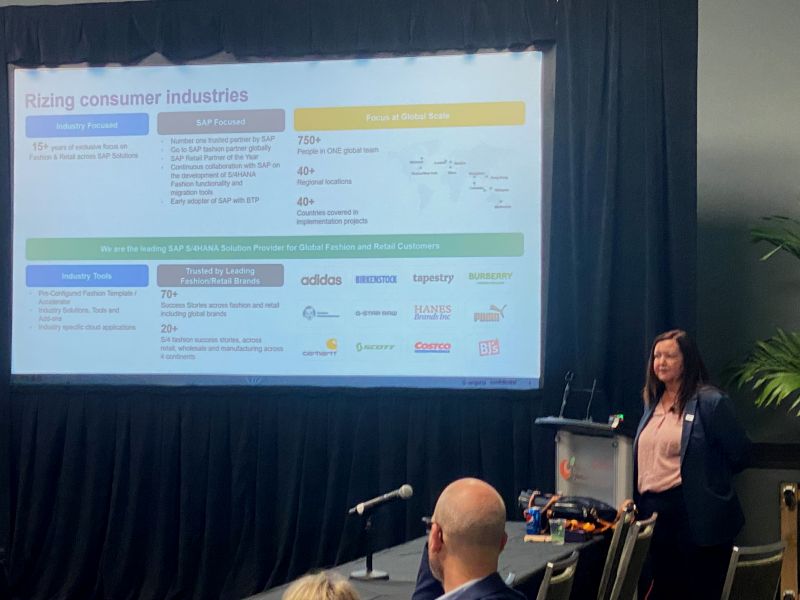Thought Leadership
Sponsored by Rizing
Innovation in the fashion industry amid an unsteady economy
Main image: Harin Nanayakkara
Global Head of Business
Development Fashion at Rizing

Harin Nanayakkara
Global Head of Business
Development Fashion at Rizing
What innovations should executives prioritize to ensure no customer is left behind in the economic downturn we're currently experiencing? We sat down with Harin Nanayakkara - Global Head of Business Development Fashion at Rizing, to talk about his experience driving growth through technology in the fashion industry and his insight on why customer centricity should be top of mind among fashion executives.

Harin Nanayakkara
Global Head of Business
Development Fashion at Rizing
Real-time data visibility and transparency – the key for growth for fashion companies
Technology is poised to reach a turning point in today’s fashion industry. The advancement of AI is gaining momentum, and the excitement surrounding consumer experience is shifting towards more practical applications centered on innovation and engagement. However, the current global economic downturn is putting pressure on businesses to optimize both online and brick-and-mortar retail ecosystems for success.
"Start by understanding the customer experience," advises Harin. "Brands require accuracy, and consumers demand visibility. This is where transparency emerges as a cornerstone. Brands and manufacturers must share their data to address challenges affecting the customer experience. Our conversations with customers underscore the importance of tapping into this data to support better business outcomes.”

The market disruption is pushing fashion leaders to reconsider production as well, exploring new supply chain models like vertical integration, nearshoring, and small-batch production with advanced digitization. He adds, "We're helping leading manufacturers bolster their digital core for this change."
He elaborates that Rizing's fashion clients are currently delving into various approaches through which data, analytics, and automation can enhance operational efficiency and extend a range of new services to customers. He anticipates a continuation of this trend over the upcoming years, as businesses increasingly adopt emerging technologies to improve operations.
The importance of unifying the entire value chain
While consumer-facing technology often steals the spotlight, the true power of technology lies in its ability to transform the entire fashion value chain. He points out, “The increasing role of technology in the fashion industry includes more than just customer programs. It's about seamless integration and visibility across the entire organization. Our successes show technology, especially a digital ERP core that acts as the nerve center of all operations, is crucial for the fashion value chain, whether its managing inventory, pricing, or designing and producing products”.

Rizing at SAP Sapphire 2023, sharing our experience at the Fashion Roundtable alongside customers
However, there is still a gap within the industry. According to Harin, many of the industry’s pain points are rooted in outdated technology. He emphasizes that many companies have fragmented systems with minimal supply chain visibility, which becomes more critical in the face of an unsteady economy. He adds, “It's time for fashion companies to think about where they want to be in ten years and then plan backward from there. Companies must ask themselves, "How can we fundamentally redefine our approach, rather than making minor tweaks to our current system?”.
Case Study: Global fashion retailer implements a single, global multi-brand ERP instance to support omnichannel processes. Read case study.
This holds particularly true as businesses adopt modern business models to maintain cost-efficiency. With the integration of third-party marketplaces into retail and wholesale channels, retailers require advanced technology to monitor inventory, and sell more without holding stock. He adds, “Success here hinges on the right business model and underlying technology.”
When asked about the current disruptions in the sector and the key to staying ahead, he stresses that downturns and disruptions are inevitable, even for those using technology to streamline their operations. But what makes a difference is agility. He parallels the pandemic and explains, " We've seen this play out. When the pandemic hit, digitization became a lifeline for fashion companies. Those who were well-prepared increased their revenue— while others saw operational gaps and weaknesses in their systems. As we move towards 2024, relying solely on basic technologies that kept businesses afloat won't be enough anymore."
The re-imagined role of the fashion store experience
When discussing the impact of technology on transforming in-store experiences for fashion brands, he cites the pandemic as having compelled the industry to blur the lines between online and physical stores.

He clarifies, “Right now, we’re witnessing the reimagined role of the store. Retailers are making significant investments, allowing in-store staff to use hand-held devices to digitally access the brand’s inventory. Many of our fashion customers are already using physical stores as inventory sources and fulfillment points when e-commerce distribution centers run low on stock. By connecting the front and back of the supply chain quickly and cost-efficiently, our fashion customers are reducing their inventory carrying costs and markdowns.”
A unified ERP system, a single customer database, and a consolidated inventory view are vital components that can bridge the digital-physical divide. A single customer database ensures a holistic understanding of the customer, and a consolidated view of inventory offers real-time insight into inventory levels and demand. This helps offer customer-friendly services like same-day shipping, real-time order updates, and order re-routing.
He concludes, “While the fundamental aspects of running a successful fashion business remain, consumers are embracing new approaches, which means fashion companies must also pivot accordingly. To thrive in this scenario, we firmly believe that swiftness and innovation will be crucial.”
Contact information
Rizing
300 First Stamford Place
Stamford, CT 06902, USA
Phone: +1 203 517 0400
Fax: +1 203 569 9776
Web: www.rizing.com
